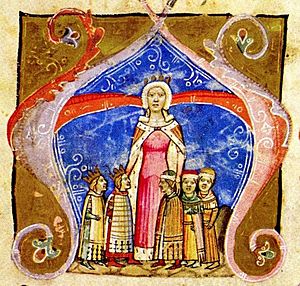Andrew, Duke of Calabria facts for kids
Quick facts for kids Andrew |
|
|---|---|
| Duke of Calabria | |
| King consort of Naples | |
| Tenure | 20 January 1343 – 18 September 1345 |
| Born | 30 October 1327 |
| Died | 18 September 1345 (aged 17) |
| Spouse | Joanna I of Naples |
| Issue | Charles Martel, Duke of Calabria |
| House | Anjou-Hungary |
| Father | Charles I of Hungary |
| Mother | Elizabeth of Poland |
Andrew, Duke of Calabria, was an important prince from Hungary. He was born on October 30, 1327, and died on September 18, 1345. Andrew was the first husband of Joanna I of Naples, who was a powerful queen. He was also the son of Charles I of Hungary and the brother of Louis I of Hungary.
Contents
Becoming King: Andrew's Story
Family Background and Early Plans
Andrew was one of three sons of King Charles I of Hungary and his third wife, Elizabeth of Poland.
In 1334, when Andrew was just seven years old, he was promised in marriage to his cousin, Joanna. Joanna was the granddaughter of King Robert of Naples. Both Andrew and Joanna belonged to the important Capetian House of Anjou family.
Why Andrew Was Important to the Throne
King Robert of Naples's right to the throne was a bit complicated. Normally, the throne would pass to the oldest son's oldest child. Andrew's grandfather, Charles Martel of Anjou, had died young. This meant the throne should have gone to Andrew's father.
However, there were worries about attacks from Sicily. A seven-year-old heir like Andrew's father was seen as too young to protect the kingdom. So, the throne was offered to King Robert instead. To make up for this, Andrew's father was given the claim to the throne of Hungary.
When King Robert died in 1343, he left his kingdom to his granddaughter Joanna. He did not mention Andrew in his will. This meant Andrew was not given the right to rule alongside Joanna.
The Fight for the Crown
With the Pope's approval, Joanna was crowned the sole ruler of Naples in August 1344. Andrew became worried for his safety. He wrote to his mother, Elizabeth, saying he might have to leave the kingdom.
His mother came to Naples to help. Before she returned to Hungary, she reportedly convinced Pope Clement VI to change his mind. The Pope then agreed to allow Andrew to be crowned king. She also gave Andrew a special ring. She believed this ring would protect him from harm.
Andrew's Controversial Decisions
In the summer of 1344, Joanna became ill. During this time, Andrew made a decision that caused a lot of trouble. He released the Pipini brothers from prison. These brothers had been jailed by King Robert for serious crimes like murder and treason.
Their lands had been given to other nobles. When Andrew released the brothers, these nobles became very angry and hostile towards him.
Andrew's Death and Its Impact
When the nobles heard that the Pope had changed his mind about Andrew's coronation, some of them made a plan. They wanted to stop Andrew from becoming king. It is not known if Queen Joanna was involved in this plan.
During a hunting trip in Aversa, Andrew left his room late at night. He was attacked by the group of conspirators. A servant locked the door behind him. Andrew fought hard, calling for help. But he was eventually overpowered and killed.
What Happened Next
Andrew's death caused many problems for Joanna's rule. Even though she was found innocent in the trials that followed, people still suspected her.
Andrew's older brother, Louis I of Hungary, invaded the Kingdom of Naples several times. He tried to remove Joanna from power. Many years later, in 1382, their relative Charles of Durazzo conquered Naples with help from Hungary. He imprisoned Joanna. By this time, Joanna had married three more times since Andrew.
Andrew and Joanna had one son, Charles Martel. He was born after Andrew's death, on December 25, 1345. Sadly, Charles Martel died young in Hungary, sometime after May 10, 1348.
See also
 In Spanish: Andrés I de Nápoles para niños
In Spanish: Andrés I de Nápoles para niños
- Philippa of Catania
 | Anna J. Cooper |
 | Mary McLeod Bethune |
 | Lillie Mae Bradford |


